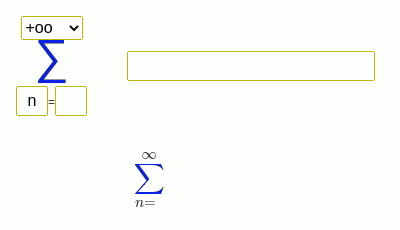Sum of series 1/(2k+1)^2
The solution
You have entered
[src]
oo ____ \ ` \ 1 \ ---------- / 2 / (2*k + 1) /___, n = 1
$$\sum_{n=1}^{\infty} \frac{1}{\left(2 k + 1\right)^{2}}$$
Sum(1/((2*k + 1)^2), (n, 1, oo))
The radius of convergence of the power series
Given number:
$$\frac{1}{\left(2 k + 1\right)^{2}}$$
It is a series of species
$$a_{n} \left(c x - x_{0}\right)^{d n}$$
- power series.
The radius of convergence of a power series can be calculated by the formula:
$$R^{d} = \frac{x_{0} + \lim_{n \to \infty} \left|{\frac{a_{n}}{a_{n + 1}}}\right|}{c}$$
In this case
$$a_{n} = \frac{1}{\left(2 k + 1\right)^{2}}$$
and
$$x_{0} = 0$$
,
$$d = 0$$
,
$$c = 1$$
then
$$1 = \lim_{n \to \infty} 1$$
Let's take the limit
we find
$$\frac{1}{\left(2 k + 1\right)^{2}}$$
It is a series of species
$$a_{n} \left(c x - x_{0}\right)^{d n}$$
- power series.
The radius of convergence of a power series can be calculated by the formula:
$$R^{d} = \frac{x_{0} + \lim_{n \to \infty} \left|{\frac{a_{n}}{a_{n + 1}}}\right|}{c}$$
In this case
$$a_{n} = \frac{1}{\left(2 k + 1\right)^{2}}$$
and
$$x_{0} = 0$$
,
$$d = 0$$
,
$$c = 1$$
then
$$1 = \lim_{n \to \infty} 1$$
Let's take the limit
we find
True
False
The answer
[src]
oo
----------
2
(1 + 2*k)
$$\frac{\infty}{\left(2 k + 1\right)^{2}}$$
oo/(1 + 2*k)^2

Examples of finding the sum of a series
- The Sum of the Power Series
x^n/n
(x-1)^n
- Factorial
1/2^(n!)
n^2/n!
x^n/n!
k!/(n!*(n+k)!)
- Flint Hills Series
csc(n)^2/n^3
- Basel problem
1/n^2
1/n^4
1/n^6
- Harmonic series
1/n
- Grandi's series
(-1)^n
- Alternating series
(-1)^(n + 1)/n
(n + 2)*(-1)^(n - 1)
(3*n - 1)/(-5)^n
(-1)^(n - 1)*n/(6*n - 5)
- Newton–Mercator series
(-1)^(n + 1)/n*x^n
- Exam the series for convergence
(3*n - 1)/(-5)^n

 1/3^n
1/3^n
 1/(n*(n+2))
1/(n*(n+2))
 cos(2*n)/n^2
cos(2*n)/n^2
 sin(n)^2/n^(3/2)
sin(n)^2/n^(3/2)